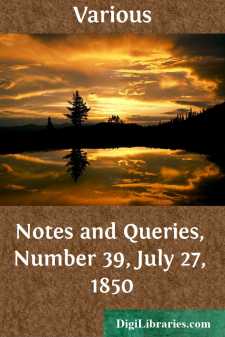Categories
- Antiques & Collectibles 13
- Architecture 36
- Art 48
- Bibles 22
- Biography & Autobiography 813
- Body, Mind & Spirit 142
- Business & Economics 28
- Children's Books 17
- Children's Fiction 14
- Computers 4
- Cooking 94
- Crafts & Hobbies 4
- Drama 346
- Education 46
- Family & Relationships 57
- Fiction 11829
- Games 19
- Gardening 17
- Health & Fitness 34
- History 1377
- House & Home 1
- Humor 147
- Juvenile Fiction 1873
- Juvenile Nonfiction 202
- Language Arts & Disciplines 88
- Law 16
- Literary Collections 686
- Literary Criticism 179
- Mathematics 13
- Medical 41
- Music 40
- Nature 179
- Non-Classifiable 1768
- Performing Arts 7
- Periodicals 1453
- Philosophy 64
- Photography 2
- Poetry 896
- Political Science 203
- Psychology 42
- Reference 154
- Religion 513
- Science 126
- Self-Help 84
- Social Science 81
- Sports & Recreation 34
- Study Aids 3
- Technology & Engineering 59
- Transportation 23
- Travel 463
- True Crime 29
Notes and Queries, Number 39, July 27, 1850
by: Various
Categories:
Description:
Excerpt
NOTES.
ETYMOLOGY OF "WHITSUNTIDE" AND "MASS".
Perhaps the following Note and Query on the much-disputed origin of the word Whitsunday, as used in our Liturgy, may find a place in your Journal. None of the etymologies of this word at present in vogue is at all satisfactory. They are—
I. White Sunday: and this, either—
1. From the garments of white linen, in which those who were at that season admitted to the rite of holy baptism were clothed; (as typical of the spiritual purity therein obtained:) or,—
2. From the glorious light of heaven, sent down from the father of Lights on the day of Pentecost: and "those vast diffusions of light and knowledge, which were then shed upon the Apostles, in order to the enlightening of the world." (Wheatley.) Or,—
3. From the custom of the rich bestowing on this day all the milk of their kine, then called white meat, on the poor. (Wheatley, from Gerard Langbain.)
II. Huict Sunday: from the French, huit, eight; i.e. the eighth Sunday from Easter. (L'Estrange, Alliance Div. Off.)
III. There are others who see that neither of these explanations can stand; because the ancient mode of spelling the word was not Whit-sunday, but Wit-sonday (as in Wickliff), or Wite-sonday (which is as old as Robert of Gloucester, c. A.D. 1270). Hence,—
1. Versteran's explanation:—That it is Wied Sunday, i.e. Sacred Sunday (from Saxon, wied, or wihed, a word I do not find in Bosworth's A.-S. Dict.; but so written in Brady's Clovis Calendaria, as below). But why should this day be distinguished as sacred beyond all other Sundays in the year?
2. In Clavis Calendaria, by John Brady (2 vols. 8vo. 1815), I find, vol. i. p. 378., "Other authorities contend," he does not say who those authorities are, "that the original name of this season of the year was Wittentide; or the time of choosing the wits, or wise men, to the Wittenagemote."
Now this last, though evidently an etymology inadequate to the importance of the festival, appears to me to furnish the right clue. The day of Pentecost was the day of the outpouring of the Divine Wisdom and Knowledge on the Apostles; the day on which was given to them that HOLY SPIRIT, by which was "revealed" to them "The wisdom of God ... even the hidden wisdom, which GOD ordained before the world." 1 Cor. ii. 7. It was the day on which was fulfilled the promise made to them by CHRIST that "The Comforter, which is the HOLY GHOST, whom the Father will send in my name, he shall teach you all things, and bring all things to your remembrance, whatsoever I have said unto you." John, xiv. 26. When "He, the Spirit of Truth, came, who should guide them into all truth." John xvi. 13. And the consequence of this "unction from the Holy One" was, that they "knew all things," and "needed not that any man should teach them." 1 John, ii. 20. 27.
Whit-sonday was, therefore, the day on which the Apostles were endued by God with wisdom and knowledge: and my Query is, whether the root of the word may not be found in the Anglo-Saxon verb,—
Witan, to know, understand (whence our wit, in its old meaning of good sense, or cleverness and the expression "having one's wits about one," &c.); or else, perhaps, from—
Wisian, to instruct, show, inform; (Ger....












